|
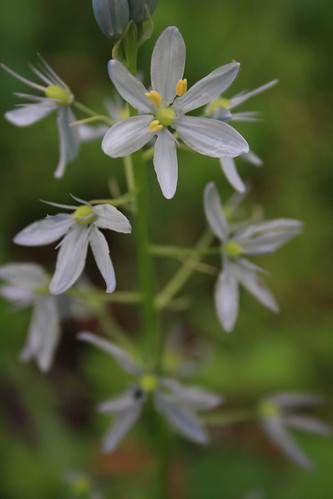
Wild hyacinth, Camassia scilloides, by creekside.
(*photo credit)
May 1, 2013 Nine Benefits of Flowers during Wildflower Week
Lovers of flowers know their value. In 2007 this website started to add flower photos at the beginning of each month and then expanded to a number of the daily reflections. We have also added the homegrown feature of simple poems about flowers of the month in our part of the floral world. Consider ways to express yourself through flowers:
1. Aesthetic -- Encourage others to discover and express the beauty of flowers and why these attract everything from insects to human beings, who like added beauty in otherwise drab lives. My own love of flowers comes through my family, and on returning to ancestral Alsace and the Rhineland I saw floral testimonies: from windowboxes to traffic circles and from cemeteries to walkways.
2. Pedagogical -- We learn much about the diversity of all creation by studying the various flowers we find in the wildlands or in cultivated plots. Maybe it is impossible for us to remember the various common or scientific names, but simply inspecting their shape, color and growing habits we learn more about floral nature.
3. Psychological -- Those who are isolated or ill are assisted in their recovery through a gift of flowers in ways no one can fully appreciate. Depression is overcome and thus the environment is better for recovery to good mental health through flowers.
4. Artistic -- There is something enticing in either photographing flowers or in arranging cut flowers for a bouquet in a home. The latter artifact is of short duration unless the living art piece is photographed or painted, but it tells something about the arranger. In a diverse floral landscape one can observe a palette of vegetative beauty that can furnish changing color and shade on a daily basis.
5. Entertaining -- Those who care for flowers find great enjoyment in the work involved and regard floral work a rich form of recreation, often in solitude except for flowers.
6. Ecological -- The proper placement of flowers in a lawn, garden, or individual plots has a sense of completeness. Some flowers discourage pests while others attract pollinators and thus serve as instruments for balancing the growing season in a friendlier manner.
7. Economical -- Flower-growing is a prize fully worth the effort and of small price compared to the many economic benefits associated. Floral presence enhances the value of property, just as trees do. Flowers attract visitors and tourists, and give a sense of wellbeing to a community.
8. Creative -- When flowers are included among the creatures we admire, we find inspiration that allows to us reach out and do more creative things with an ever wider world around us.
9. Spiritual -- I am convinced that God speaks to simple folks through flowers, and have found this upon the death of loved ones. Others testify to the same thing. The pain of death of another is overcome through blooming flowers, God's gentle comfort to us all.
Prayer: Lord, inspire us to proclaim the grandeur of creation through the simple act of promoting flowers in various ways.
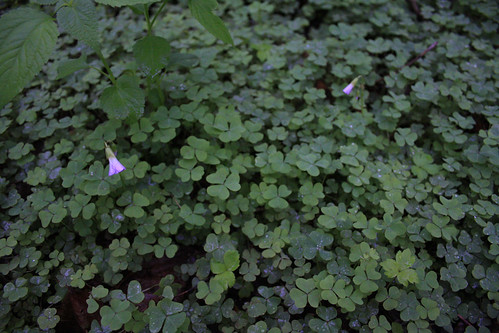
Violet wood-sorrel, Oxalis violacea.
(*photo credit)
May 2, 2013 The Earthly Joys of Our Faith
We believe that the joys of heaven and angelic choirs await those who toil patiently and are right with the Lord. What we seldom enumerate are the joys that can accompany this life, no matter how trying the circumstances. Try listing such joys:
* Christ is a constant loving and merciful companion on our trying journey;
* He is willing to converse at all times, for we are confident prayers are always received;
* The sacramental life gives us a warm feeling even in times of depressing conditions;
* Forgiveness is promised and actualized, and so we are potentially able to live a new life even after misdeeds;
* Prayerful requests are answered with certainty even though at times we must trust results for our betterment;
* Situations that seem so difficult are resolvable through our constant trust in God even if some are resolved after our lifetime;
* Work done with sincerity has meaning and thus we are able to see it and the benefits of our labors;
* Memories of loved ones are warm with the sure hope that we will be reunited with them after our passing;
* The promise of eternal life lightens our journey and keeps any shadows of a cold grave in a distant background;
* Concerns about others have a fuller sense of compassion for we are working with the Lord;
* Our community of believers gives us constant support in times when we really need it most;
* Calvary and Resurrection are extended in space and time and so we are participants in these powerful sad and happy events;
* We experience a maturing in our spiritual growth over time with the help of God's grace;
* We begin to see more clearly the face of Christ shining up to us from all creation;
* Morality becomes a better signpost in our lives as we grow in confidence that the Lord will help us through temptations;
* Heroic people who pass on are not really cut off from us, for our community extends beyond the grave;
* We are gratified by living examples of people who truly believe and give us courage by their lives;
* Service has many gratifying experiences that when reflected upon give great pleasure;
* Gratitude for being allowed to live at this moment in history gives further joy;
* Knowledge that the world will survive its turmoil even though we may not know how; and
* Aging gracefully and appreciating all the good gifts which God has given us comes more easily.
Prayer: Lord, let us be people of utter joy and to show this no matter how seriously we attempt to make the changes that have to be undertaken at this time.
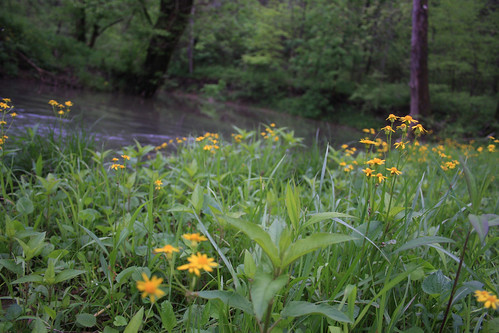
Golden ragwort, Senecio areaus.
(*photo credit)
May 3, 2013 Healing Coupled with Earth: Various Meanings
A simple Google word-search shows the average browser that two words in their variations of "Earth" and "healing" have been used by this site for the past three decades. However, others, for a variety of reasons, use the name as well, and so for a number of years groups who are unrelated have earth and healing titles; some regard themselves as in tune with Earth's "healing powers" and thus transmit this to their clients; other users have potions, assorted objects, and practices with the powers of "Mother Earth" to help themselves or others to be in tune with the rhythms of Earth. We are not interested in enumerating or describing the variations, but to emphasize great differences in name use.
Healing of Earth means for us on this website that we as believers (and often designated as Christian believers) are able with God's help to heal and save our wounded and threatened Earth. This healing needs to be authentic and effective, and so practices of simple living and alternative lower-impact energy sources are championed. Our "Earth Healing: a Systems Approach to Resource Use" operated for two decades and assisted some 200 non-profit institutions in 33 states and Canada in setting up programs to make their properties greener. We published a book entitled "Earth Healing" in 1995 and reissued this by Brassica Books in 2011; we have a video by Seascapes Publishing called "Healing Earth: Our Common Blessing." Of course readers realize that "Earth Healing, Inc" has been around for almost a decade and ultimately seeks to root out the cause of the environmental crisis -- and receives well over one million hits each month.
The difficulty is not coming from traditional "healing and earth" users who have their own practices and potions, but from new entries in the field who consider using the name in an environmental manner, but not necessarily progress beyond first or second levels of eco-awareness (pollution real or threatened and remedies and lifestyle changes). A basic diagnosis of Earth's maladies (first level of eco-awareness), or to taking some of the palliative approaches to the problem such as living a simplified lifestyle or replacing fossil fuels with renewable energy sources (second level of eco-awareness) are not sufficient. Our problem is with those who regard themselves as healing without going beyond comforting treatments of a troubled world. Is that healing?
To fail to pinpoint the underlying cause of environmental crisis for fear of alienating donors or being rejected by status- quo seekers is a great disservice to a name that has attempted to look more deeply into the causes of the environmental crisis. Yes, it involves economics stupid! Better, it's social and political economics! It is a rampant materialistic consumer culture that helps reinforce a social addiction that cannot be addressed by mere academic course work or other secular exercises. Addictions demand turning to a Higher Power for they are beyond solely human control.
Prayer: Lord, help all healers of Earth to be authentic.

Working in the garden at age 92.
(*photo credit)
May 4, 2013 The Benefits of Opting for Garden Variety
The "how to" effect a healthy garden variety was listed on March 4, 2008: choice of favorite produce, soil conditions, microclimate, space and placement limitations, solar radiation (sunlight) rates, crop rotation, and suggestions for interplanting to save space. The list is formidable and challenging but does not include the reason for choosing variety. In fact, the "why" was presumed and it is worthwhile to expand that why with some benefits:
* Educating potential -- Variety gives growers, neighboring observers, and produce sharers many new experiences in homegrown produce. Variety offers opportunities to learn how everything from eggplants to peanuts grow and ought to be managed;
* Changing landscape -- Variety adds beauty in contrast to the monotony of a single crop. Thus, the flowering and stages of growth of different plants stand next to each other (variety should include flowers) and allow for an ever-changing seasonal landscape;
* Practicing good ecology -- Variety does not allow pests to take over and, when well located, some flowers or herbs will actually repel those pests. Companion plants offer protection;
* Making life interesting -- Variety is the spice of life. Since vegetable cropping may satisfy a desire for growing a specific favorite, it also affords an opportunity to grow surprisingly different things with new tastes;
* Discovering new choices -- The only way to find out what grows best in your own microclimate is to test varieties of greens or tomatoes or potatoes and to record results. Make gardening an ongoing research project;
* Saving money -- New varieties allow us to improve the produce obtained and curb food costs. Discover that a dozen types of leafy greens can be raised through a growing season and the savings on salad ingredients alone are sizeable;
* Insuring against weather variations -- In years of excessive rain or drought some crops do better than others. A garden with variety allows every year to be good for one or other item and ensures against disaster;
* Talking point -- Variety gives us the reason for exchanging information with other gardeners who have their own experiences and yet want to expand their growing horizons as well. We become more experienced through variety and learn to grow green thumbs;
* Admiring creation -- Variety teaches us the need to see the treasure of the multitude of differences and how much we should protect and preserve all types of species; and
* Occupying gardening time -- Fewer species grown mean we do not spend as much time in gardening. However, this last reason may not be regarded as beneficial with those with limited time to spend gardening, but for enthusiasts it is a good reason.
Prayer: Lord, lead us to join you in admiring the wonder of different beings with their multitudes of colors, shapes, tastes, and patterns of growth. Grant us insight to see that creation in its plentitude is a treasure worth appreciation.

Carolina wren on nest.
(*photo credit)
May 5, 2013 Establishing Peace in Times of Turmoil
A peace the world cannot give, this is my gift to you.
(John 14:27)
Peace is a gift from God, not of our making. As God's children we come to recognize pure gifts for what they are, and peace is one of these. In turn, we receive, preserve, and help spread this gift as God's instruments of love and thanksgiving. Being a gift we make peace only within a humble recognition of our place as instruments of divine work; we are called to extend peace to a materialistic world in utter confusion. We are called as peacemakers to manifest the divine origin and destiny of peace -- for peacemaking is essential in establishing the Kingdom of God.
Establish interior peace. The challenge is all the greater because this world seems to be more unsettled with each passing day through mob and terrorist violence, financial mismanagement, and the threat of profound climate change, to mention a few. The contrast of what occurs external to ourselves and what goes on within us is of great importance, for balancing our lives begins the process of bringing peace to others. If we have interior peace, others are able to perceive it and become encouraged by it. However, we soon learn that peacemaking is not permanently cast in concrete but requires constant prayer, sacramental life, and effort to persist as effective peacemakers.
Establishing domestic peace. Amazingly, the greatest challenge to peace in this world is not that between nations but that within our homes. All too often conflicts simmer in the home and we deny troubles, excuse ourselves, or escape to other haunts. God calls us to look within our most proximate community first, for Earthhealers are to establish peace in the interior environment with times of silence and sound-making, and exterior to the home in ecologically established yard and garden. But it is also the time to cultivate loving relationships among those with whom we live on a day-to-day basis. The devil is in the details. Again as said in other reflections, place a picture of the Sacred Heart within the home as a way to launch domestic peacemaking.
Extending peace. By recognizing God as author of peace, we start to find our need for constant communication with the Almighty, for we cannot be peacemakers by acting alone. We cultivate the peace within when we approach the challenges without. We do this in different ways depending on circumstances. We seek to bring peace to those neighbors in distress through prayer, encouragement when possible, and telling them of our concern for their situation. In extending peace we discover that our interior peace grows. Being motivated with Christ's love allows us to extend "heart" to others. These grasp a helping hand, and so catch a glimpse of contagious love. Tell them you are praying for them.
Prayer: Lord, true Peacemaker, help us make peace within ourselves, within our households, and among our neighbors who cry out for help. Let peacemaking go out to all the world.

New spring growth of the Christmas fern, Polystichum acrostichoides.
(*photo credit)
May 6, 2013 Nurses as Healers of Earth
This is National Nurses Week and worth celebrating those who are primary caregivers in our world of illnesses. Granted, most nurses with numerous patients has their hands full; are they expected to be environmentalists as well? The response is that in the manner of their lives they teach the art of being down-to-Earth and not some sort of nebulous idealists telling others what to do. Nurses do the dirty work that others hesitate to do, and they do this cheerfully and with an air that caregiving is not perfect, but still essential for others.
I come from a family that has about as many caregivers as farmers: three aunts led the way and six first cousins were nurses and two others became medical doctors. The next two generations have some already trained and working and others in preparation. Health care is a prime concern in a world where the commons must be reclaimed so that all have a higher quality of life -- the universal right to good health opportunities. The challenge in the immediate future is to make health care available, and this will take untapped resources and personnel. It can be done!
Earthhealing offers a promise that the insurmountable tasks before us are able to be realized even amid our own limitations. Nurses are not miracle workers and yet what they do manifests the miracle of life itself. Our living Earth is a miracle in its own right, and to be down-to-Earth means being well founded and immersed in the real tasks ahead of us. Even when energy lags, nurses remain as cheerful as possible and attempt to raise the spirits of those in their care. These caregivers work long hours and under conditions that would try many of us. They deserve what they earn and give far more than what is expected.
Nurses have many general characteristics that should be regarded by all budding Earth healers. They have to be proficient and practical within the healing process, not expecting the impossible; one cannot become a lone ranger in health care, for it takes teamwork. The Earth caregiver must also stay pleasant even when conditions seem quite dire all around; they must keep steady and exude a sense of hope. Health of our Earth is the caregiver's goal, and it involves more than some technical remedy or practice. When something goes wrong, the team must size up the situation and make proper adjustments of medication and service; so Earth healers working together with environmental experts can bring healing.
Nurses are practical people; they are not idealists but know the real situation and can let patients know that they care for them no matter how dire the situation. To mortal beings nurses are committed to extending good quality of life. They combine technical skills with compassion and concern; they realize their limitations and serve as models for healers of Earth.
Prayer: Lord, direct us to learn from nurses how to act and to see that within our limitations we can do some things well.

May-blooming dwarf larkspur, Delphinium tricorne.
(*photo credit)
May 7, 2013 Some Thoughts about Non-Violent Revolution
Our founding fathers believed in the moral right to revolution under given circumstances. In the spirit of these same people can we speak of a moral right of people to generate revolution -- and is it right to entertain such thoughts? Citizens today may ask, "Why change an imperfect system for something you do not know?" "Why not reform the current system and be accepted as reformers, not as the reckless who would throw the baby out with the bath water?" Such questions by status quo preservers seem enticing.
Is revolution worth considering when our consumer culture is simply not sustainable and does harm to Earth in the long term? If a system embraces unjust aspects, to revolt is one option -- and most who believe in freedom would agree, if that refers to the political or economic conditions of other folks. For many, if the question is directed to one's own economic or political system, which is a different story. The risk is more than unpopularity; it may be downright treasonous as John Hancock and others knew when appending their signatures onto the Declaration of Independence.
The current global consumer economy is unsustainable and the very stability of the planet is at stake. This involves more than just a scientific opinion of human-caused climate change. What is at stake is the livelihoods of countless millions of people, with those of little economic base being most vulnerable. On the other hand, a status quo is materialistically based and is driven by the comfort and convenience of those with self-interest in benefits of the privileged few without regard to the costs of the powerless. This current globalized consumer culture is anti-democratic for it lacks the controls on acquisition, movement, and sheltering of untaxed globalized wealth of about 20 trillion dollars.
The current system is unjust because it predicates a given pool of the unemployed who compete with each other and enhance profit taking by employers. Unemployment feeds the system -- the new form of enslavement. Ability to earn a livelihood is expected of every citizen. This current unsustainable system denies those who desire work from obtaining a job, while protecting the privileged who have the capital resources needed to create jobs. The gross materialism behind this economy is fed on a greed that is insatiable. The morality calling for change rests in the demand to always make things better, especially if inherent injustice prevails. Tweaking an unjust system prolongs injustice. It is like beautifying the hovels of slaves with whitewash.
Revolution need not be violent. The Velvet Revolution following the breakup of the Soviet Empire was non-violent. We can have a change without resorting to violent means in this enlightened age. Even some revolutions with violent aspects may be the lesser of violence being committed against a voiceless citizenry who are unable to find work for a livelihood.
Prayer: Lord, inspire us to pray the revolutionary Magnificat.

Peach tree in full bloom.
(*photo credit)
May 8, 2013 A Universal Right to Good Health
World Red Cross Day is a perfect time to reflect on global health and safety. Does an infant in a South Sudanese hovel have the same access to health facilities as you or I do? If not so, ought we to follow the example of Jesus even amid the frustration of his hometown critics who did not want his concern to extend to foreigners? Jesus justified his concern by referring them to actions of the prophets Elijah and Elisha to foreigners. So we ask ourselves: Are we who have America's privileged resources to limit these to those within our borders? Or are we to include all suffering people within the realm of God's saving grace and our helping hand? Are we to follow the example of the humble Messiah?
As members of the Body of Christ we are chosen to be servants with the Lord and extend compassion to all our worldwide brothers and sisters, even distant Sudanese. We are not on the side of Jesus' hometown audience and offended by extending concern to foreigners. If we are challenged to adjust our lives so that all have a right and the terribly expensive access to modern medicine, how on Earth will we pay the bill? We can hardly handle our individual, local, statewide, and most of all our national right to health access -- Why the unrealistic prospect of going global? Is this an example of an ideal that is not currently practical, but an ideal seeking to discover some sort of practicality?
Yes, finances are a hurdle but why build super aircraft carriers and F 35s when no other nation spend three-quarters of a trillion each year (in fact the rest of the human race put together spends about this amount)? Is our hard-earned tax money going for "practical" or impractical means of security at the moment? What is a greater security -- a sophisticated expensive fulfillment of the military/industrial complex or medicines and facilities for the poor of the world? In fact, with military funds converted to human health, wouldn't the ultimate result be greater global security?
We know of cases of individuals within our community of faith who would be dead today if it were not for 911 calls, the ambulances, emergency room units, and powerful antibiotics. Yes, though expensive these health support systems save lives. Now consider a world of people, especially infants and the young who would like the same quality of life and yet have no ambulances, ER units, and medicines (and their doctors are working in wealthier lands); our heart reaches out to them. As part of Christ's Body we are on the side of Jesus and not his rejecting audience who want his exclusive attention to focus on them alone and to forget about the rest of the world. Making health access universal means freeing up investments and tax dollars from the sinews of warfare in all its exotic forms, and instead concentrating on people who need more from the current WHO than inoculation for several childhood disease. Primary health access calls out to the privileged to share resources.
Prayer: Lord, help us be healers in the footsteps of Jesus.

Common Kentucky field sighting, yellow rocket, Barbarea vulgaris.
(*photo credit)
May 9, 2013 Human Responsibility: Arise and Save Our Earth
Why are you men from Galilee standing here looking into the sky? (Acts 1:11)
This is the traditional feast of the Ascension and a time to ask if we are truly acting. When residing at St. Peter Church near the U.S. House of Representatives in 1974 I celebrated the noon Mass on the feast of the Ascension. On entering for the Mass I noted the presence of the Speaker of the House and the Chairman of the Ways and Means Committee both present to fulfill their obligation. We had a serious national issue in which all were hesitant at that time. So I struck a strong note on "why are we looking up to heaven?" and "Let's be on with the task at hand!" Were they listening? They took some remarkable actions a little later.
Strange but this is perhaps the first time I've mentioned this incident of forty years ago, mainly because I regarded it afterwards as too blatant a political act to have been executed within a sacred homily. Today, I celebrate the Liturgy in a far more humble church in the mountains and among a quite smaller congregation in a deeply "red" state, and yet the current political/economic/social event (climate change) demands that we break silence. However, the global issue before us is more serious than in 1974. Why are we looking up to the sky when we must be on with the work of being other christs in saving our wounded Earth?
Amazingly, some who convince themselves that the Church has no business in economics would swallow the merchants of doubt stalling tactic of saying scientific evidence is not yet convincing (translated, give us another decade of making billions in profits off of fossil fuel consumption). This all adds up to a lame excuse to become neutral and withdraw from the battle until the winning side is evident. The responsibility of the Christian must be on the side of theological virtues: temperance in use of fuels; prudence in taking the most appropriate action; justice in doing self and others no harm; and courage to openly do what needs to be done, even in the face of opposition. It is not temperance to continue wasteful lifestyles, prudence to accept equal weight on both sides of a rather convincing argument, justice to ignore how some will suffer from climate change, and courage to remain silent.
The physical salvation of our planet Earth, which was saved at such a great price of Christ's death and resurrection, is the invitation we cannot refuse. This is one of the greatest challenges that we as responsible Christians have, beyond the salvation of our individual souls. Each person has that task before him or her. However, responsibility says that individual and joint salvation are somehow intertied. We are called to save what is before us and, in attempting to, we save what we must. We need faith to see connections in this current situation.
Prayer: Lord, you went ahead of us to prepare for us; help us to forge ahead by following in your pathway to salvation.

Smooth yellow violet, Viola pensylvanica.
(*photo credit)
May 10, 2013 Using "Charity" as Power
Non-profit charitable institutions take note! Isn't this a legitimate question as to how charity is used in our society? Two groups oppose each other: one says private wealth could influence society; another says public wealth must determine policy. Does this hint at a challenge to charitable power by private donors? We can hardly deny the influence of those who have billions to give and are open to suggestions by institutions with outstretched hands. However, Jesus gives us a corrective when it comes to pure charity. He and his disciples watched the poor widow giving of her basic means (in pennies) to the temple treasury; for Jesus, she was giving the most of anyone. Have you ever heard of the poor being memorialized for giving pennies (no matter how hard earned)?
The use of charity as power is seldom mentioned because many feel the charitable person has a right to see that his or her money is used properly and that donors insist that certain strings be attached; thus, money is accounted for as deemed best by the "owner" donor. The position's strength is that the funds will be used in a responsible manner before they are wasted; its weakness is that the exercise of power in donation comes from the money that really does not "belong" to the donor in the first place. It's God's money and democratic people must exercise such power to see that the commons are used responsibly.
The additional weakness is the competition, for this charity makes aspiring parties keep to the expected donor's leash in order to compete for grants. Thus, a power is exercised beyond actual charity, and involves being rich and willing to deal with the begging party. The status quo is preserved all the more when the wealthy can exercise such power over begging institutions. In this globalized age when money matters are not easily transparent, accumulation of wealth and its mobility are a new phenomenon. Uncontrolled wealth of immense billions is utterly dangerous and is subject to being autocratically used. "Charity" is that instrument of power that stops conversation and never allows us to question motivations. Some may even insist questioning is rash judgment.
Should we not challenge a system where charity becomes power? Let us tax the surplus so the temptation of power through immense "Charity" does not arise. An accumulation of small donations for some agreed purpose is a good use of charitable donations. The ability to accumulate and retain vast sums of money and exercise power through political, economic, or social initiatives is beyond the bounds of democracy. It is a blatant example of the Divine Right of the Wealthy to set and determine policy, much of it to continue the perpetuation of that wealth through inheritance and beyond the lifetime of the holder of wealth.
Prayer: Lord, help us insist that public funds be used with responsibility and that private funds be removed through taxation or free donation and used for those with the most pressing needs.

Spring streamside view.
(*photo credit)
May 11, 2013 The Privilege to Serve Others
As we approach Mother's Day it becomes evident to us that service is what mothers give their offspring; their love-wrapped service that is regarded by them as a privilege. We too need to see our service for others (a broader world of brothers and sisters) as an opportunity to exercise the privilege of living at this time and having the energy and faith to carry on in our ministry of service. Our gifts of intelligence, culture, and material goods tempt us to see undeserved privileges as coming with no responsibility attached. Did we really earn them, or pure gifts like noble lineage, or gifts calling for manifested responsibility?
Privileges do not come through nationality, color of skin, or transitory physical endowments; we are truly privileged in a spiritual way when we respond to the gift of service opportunities afforded us for the good of others. We look to the humility of Jesus, the ability and inclination to be down-to-earth. We are called to serve and this service means helping others who are in need. When we answer this illustrious call we are accepting a privilege of being here at this time and willing amid it all to do something.
Let's pass over those who overlook their gifts and potential for exercising privilege, and consider instead the models of people who do their duties well -- quite often our unsung mothers. These nurtured us and spent sleepless nights when we were sick and never with a complaint or dash of selfishness. By giving all they had to their own they answered privilege in gratitude for the chance to do what had to be done. Some who care for others (teachers and even bus drivers) are so selfless that they give their lives for the good of those under their care. They are unsung heroes and heroines; they deserve thanks for giving service through sacrifice.
Every Christian is called to see our opportunities to serve others, even while tempted to overlook the obvious and look about for potential drama. The degrees of service before us are often so very simple that it stares us in the face. Let this reflection be a double challenge: stop long enough to see the opportunities of service that come to us right here and now; let's see it in its full dimensions though hidden from public view, misunderstood, unappreciated, and soon forgotten when done. God alone knows our selfless service and that is sufficient, for in doing this we follow Jesus who suffered for all the thankful and thankless.
Children should be encouraged to have a deepening sense of gratitude that is expressed more openly by some over others. Our individualistic culture will turn these expressionless youth into spoiled brats who are thankless and think they deserve extraordinary motherly service. Let's remind each other that true privilege is what is needed at this Mother's Day celebration.
Prayer: Lord, teach us to be thankful for our selfless mothers, both those living and deceased.

Natural bouquet for Mother. Wild blue phlox, Phlox divaricata.
(*photo credit)
May 12, 2013 Mother's Day and Rising to the Occasion
Only rarely does Mother's Day and our celebration of Ascension Thursday fall on the same day. The challenge to the homilist is to give some meaningful words that combine the two events, and this attempt only admits partial success.
The Ascension event is a mystery of separation and togetherness, for in leave-taking Jesus announces that he is spiritually present with us until the end of time. Jesus is a model in his acts of suffering, death, and rising, and disciples are saddened to see him depart from their midst. Jesus goes before them (and us) in preparing the way for us to follow. He is ahead in time and yet shows ever present concern about our welfare and our journey in faith. The ascended Jesus is both here and is away; here in the mystical Body, present when we pray, and here sacramentally in the Eucharist. We know that a second coming will give completeness to our physical union with the Lord of glory.
Mother's Day is a time of special remembrance and the opportunity for many to show gratitude for mothers who nurture, feed, and care for their children with love. Here our treatment of Mother's Day depends on whether those mothers are living or have passed on to eternal life. For those fortunate with a living mother present, the opportunity is to express respect in signs of love, tenderness, and devotion for the mother's selfless acts of love. Love is all we have that is permanent and a mother's love is a great teaching tool; it can make a lasting impression on us all.
To those of us whose mothers have passed on to eternal life, our mothers are absent and yet present as well, for their acts live on beyond their lives. In some cases, our mothers have been gone for years and yet their attention and ways of doing things stand out as though it were just yesterday. Some of us find ourselves judging events in the light of our mother's presence, even though they are not here. Perhaps it is a carry over from youth but the foremost models we have of selfless love happens to be our mothers, who never complained no matter how difficult those nurturing deeds.
In some ways, our mothers are like the Lord; they go ahead of us in time and yet through their examples they act as beacons on our journey in life. They have enlightened us through their love. When we come to our last moments of mortal life, our love is the only thing we will carry with us, for we are naked on leaving as on coming into this world. We bear to the throne of the Most High our love for God and others, a love that in its start is a pure gift from God. That love is ever made new when we carry the love of God through the person of Jesus with us on our journey of faith. Our mothers' help start that journey through their love, and they too had Jesus' love with them on their journey.
Prayer: Let each of us appreciate your gift of a mother's love taught through individual persons of our lives who went before us with selfless love.

Early bud growth of the shagbark hickory, Carya ovata.
(*photo credit)
May 13, 2013 Conservation Tillage and "Ecological Farming"
Last year a major portion of the United States experienced the worst drought in fifty years. Entire areas of the vast corn and soybean belt that supplies a sizeable portion of food for our hungry world sweltered under record heat and lack of plentiful rainfall for months. Will this phenomenon repeat itself in 2013?
We are at the mercy of the elements and yet there are certain practices that can reduce the ill effects of such harsh conditions. One of these is conservation tillage. David Brant, a farmer with 1,150 acres in Carroll County, Ohio used a no-till method of protection by an eight-species, cover-crop blend including alternating rows with radishes and Austrian winter peas. The ground temperature of his farm was about 80-90 degrees F in contrast to tilled fields of neighbors reaching 130 degrees. Besides lower soil temperatures, the cover crops helped retain moisture level. The result was corn averages of 165 bushels per acre, in contrast to neighbors using conventional methods and getting 100 bushels per acre. <brndtsfarm@yahoo.com>
Live plant mulching has been known for centuries but not something that corn and soybean farmers with their heavy equipment and standard plowing methods considered. Perhaps no one has the time or resources to spread mulch materials between rows of large fields of corn? Last summer, I covered my small patch of cucumbers with Remay to retain moisture and reduce soil temperature, and it was partly successful. However, small plot gardening is not large-scale farming. Furthermore, interplanting with early producing vegetables covers the garden space with green mulch while taller vine or stalk crops are gradually coming to full foliage. What Brant was proving was that a living mulch planted along with the grain crop retains moisture and lowers the impact of extreme weather conditions. It also reduces soil erosion in rainy times.
"Ecological Farming" means using methods that are less harsh by minimizing the amount of bare soil in corn or soybean fields. No-till methods using living mulch are certainly better than heavy use of herbicides during the growing season. Less fuel expended is one obvious advantage. Interplanting legumes reduces need for commercial nitrogen fertilizer application and thus results in less runoff of fertilizers and water contamination. The goal is to mimic mother nature and to abandon some soil disturbance methods that led to soil mistreatment and erosion. Difficulties are due to traditional methods when settling the Great Plains. In fact, the corn/beans/squash "three sisters" method of Great Plains Native American agriculture before European farmers was closer to these innovative no-till methods than to the traditional settlers' methods. More innovative approaches such as drought-resistant types of corn are being tried as climate change accelerates.
Prayer: Lord, give us the willingness to adapt our lives to the conditions facing our world in this century -- and to do all we can to continue the plentitude of the world's food basket.

Jacob's ladder, Polemonium reptans.
(*photo credit)
May 14, 2013 Land for Essential Needs: Food Production
-------------------
The one who wrongly holds that every human right is secondary to his profit must now give way to the advocate of human welfare, who rightly maintains that every man holds his property subject to the general right of the community to regulate its use to whatever degree the public welfare may require it. Theodore Roosevelt
Without sufficient cropland, much of the world's one billion people who live in food-insecure regions face major hunger problems. In this decade, we experience rising food prices that are troubling to people of limited incomes. The U.S. Department of Agriculture (USDA) Food Security Assessment states that between 2006 and 2007, the number of food insecure people (less than 2,100 calories per day) went from 849 to 982 million in 70 lower-income countries. Food security and productive land go hand-in-hand. The terror of hunger is an abomination in an age of plenty and, with enormous food wastes (enough to feed a major portion of the world's hungry), the wrong is magnified. Food shortages resulting from increased biofuel production or natural disasters contribute to the disturbing pattern of continued higher prices.
Scarcity of cropland grows with population. Most staples are grown on productive land that is limited and being taken out of production through commercial development and recreational purposes. While some dire emergencies can be met by shipments of food from surplus nations, a more sustainable approach is to produce food at the local point of consumption. Subsidies in richer nations go to large agricultural enterprises that unfairly compete with small-scale farming operations. Farmland price inflation continues and soon is beyond the reach of most aspiring farmers. Sometimes surviving family members cannot afford estate taxes. Economic incentives are often lacking, thus leading to further sub-division of small family farms or the forced migration to urban areas. In contrast, large landholders occupy land for their own extravagant purposes -- lawns, hunting preserves, buffer zones, scenic views. Redistribution becomes a major problem.
Large estates often occupy potential farmlands but remain in an ornamental condition, often to the benefit of outside wealthy interests -- and to the detriment of poorer local inhabitants. All the while, potential small-scale producers cannot find territory on which to grow their own crops. If more attention were paid to farmers growing produce to feed their locality, part of the current global hunger problem could be alleviated. However, estate redistribution is difficult in part because new farmers need initial capital and are often inexperienced in homesteading practices. Targeting underutilized, fallow or decorative lands for food production could provide one-quarter of America's food supply, if a modern version of the World War II "victory gardens" were reintroduced.
------------------ Reclaiming the Commons
Prayer: Lord, grant us grace to help those who need farmland.
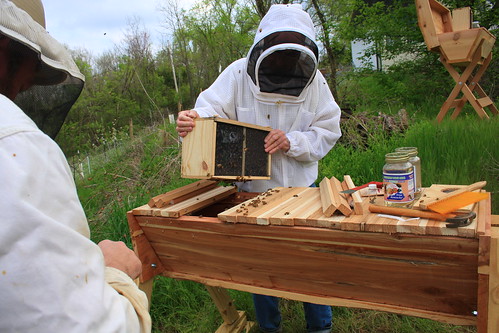
Installing honeybees into Kenyan top bar hives.
(*photo credit)
May 15, 2013 Land for Essential Needs: Housing
The issue of proper use of land extends beyond a series of issues dealing with farms and corporate competition for the same land. Essential housing problems are land issues as well, for many especially migrants from rural to urban areas do not have space in which to build homes for their families. In Chapter Three of Reclaiming the Commons the following is found on this subject:
-----------------------
In 2011, heavy rainfall caused a populated hillside in La Paz, Bolivia, to collapse, destroying homes of several thousand people. Residents were angry because they had to build on steep, slip-prone hillsides with no planning, few streets, and little sewage and water facilities. In many parts of the world, lower-income people build their own residences on flood plains and where unsuitable land is all that is available. The reason a million Haitians were without housing a year or so after the January 2010, earthquake was lack of clear title to housing sites, a global problem but magnified in Haiti.
Scarcity and extravagance exist side-by-side. A Los Angeles suburb challenges construction of a mega-mansion of 80,000 square feet. In 2013, some seven million Americans paid over half their income for housing. The Great Recession indicated connections between housing and credit crises, with millions of residences going "under water" (mortgages higher than market value). At this time, the American debt load was over $12,000 per household, with interest rates high (18.9% on credit cards for most average borrowers and up to 30% for those with poor credit ratings). Unregulated finances leads to usury and red-lining neighborhoods.
Unproductive public lands comprise almost one-quarter of the U.S. surface area. Mountains and deserts and wetlands are part, but are often "productive" wildlife habitats. However, urban-abandoned lands in depopulated cities can be made productive. Hard-hit Detroit now has over 800 urban gardens (some up to an acre in size), where vacant residence plots have been turned into urban homesteading. Vacant military bases, portions of airfields, prison grounds, highway right-of-ways, cemeteries, educational, health and technical institutions and other facilities contain potentially productive lands. In times of financial difficulties, privatizing such areas becomes a temptation -- sell or lease parks, prisons and municipal water works -- even highways. Corporate propaganda deliberately denigrates public management while overlooking profits leading to curtailment of services through "better management" -- though underground utilities) can be hidden from scrutiny.
----------------------
Prayer: Lord, guide our homeless to find decent housing to live in relative safety from the elements and the threats that surround them. Inspire us to work for affordable housing for all.

Pollinator visits spring beauty, Claytonia virginica.
(*photo credit)
May 16, 2013 The Peace Dividend as a Rare Opportunity
This is Wear Purple for Peace Day. Different colors have special meaning (green, pink, yellow, etc.) but peacemaking certainly deserves its special color. With the current peacetime dividend, a feedback loop of national and global benefits will result. Peace-loving people pray and work for the beginning of a contagion of benefits that will make peace more than a promise to become a reality in a strife-prone world.
When this reflection was drafted, a major commitment was being made to settle the terrible Syrian Civil War and other global conflicts by diplomacy, with the possibility of success. Looming in the background was a Chinese/Japanese dispute over some uninhabited rocky islands that both countries claimed within the Okinawa Island chain. Certainly peaceful resolutions are high on the international agenda. If open warfare is halted or forestalled then peace dividends can start to work. This consists of saving money that would have gone for military hardware and personnel; these can be diverted to health, educational and infrastructural benefits that are most needed today (see May 8).
Is the peace dividend more than wishful thinking? Could the combined military budgets of the world be reduced and savings accrue through making rapid-deployment strike forces a reality? Couldn't these corps be multi-national in composition and trained by experienced national units? Couldn't sophisticated military hardware be reduced dramatically or eliminated? Doesn't the mere possibility of economic benefits drive the peace forces forward?
Is it more than economic savings? With less weaponry, all nations would have less temptation to engage in a conflict with neighbors and others. Militarism as a solution to conflicts takes a back seat to diplomacy to the betterment of all parties by peaceful means, an entirely new mindset needed to settle disputes. Powerful nationalistic competition such as existed a century ago in Europe prior to World War I's inception, must be avoided.
Does a dividend give expanded opportunities? When peaceful opportunities afford themselves all democratically participating citizens are called to act. We have to present citizen pressure on legislators to take on the spirit of peace, not be coerced to support belligerent forces capable of conquering another. In fact, part of the citizen efforts must be dangling peace dividends before politicians, with hopes that they might see dividends as political and economic opportunities. Think of ways saved money can be better spent: debt reduction, improved infrastructure development; and more and higher paying jobs for the unemployed, health and safety issues, and still more.
Prayer: Lord, give us the grace to see peacemaking as an opportunity whose time has come; inspire us to communicate this optimism to all parties, especially our legislators and national executive leadership.

Floral trail.
(*Photo by Theophilos Papadopoulos, Creative Commons.)
May 17, 2013 The Benefits of the Bicycle
On Bike to Work Day we could well afford to list the many benefits that increased bicycle use will give. In earlier and more energetic years I biked to work across Washington, DC. Over time, more benefits accrued, even when my actual biking declined:
* Convenience: Bikes enable the person to cover relatively long distances in a reasonable amount of time. If skilled, the biker can easily move through heavy traffic provided the biker and all approaching car drivers are alert enough. Bikes are easy to park, take up little space, and can even be carried into some office or residential space for protection.
* Non-renewable energy: If we omit human energy (and that comes mostly from renewable food resources), the fuel for autos and buses is unneeded for riding a human-powered bike.
* Non-polluting vehicle: Cars and internal combustion traffic that are so prevalent in this country and now in Asia and among emerging economies cause air pollution. Chinese cities, such as Beijing, are moving rapidly from a bike economy to an auto one, with the consequences of choking pollution for pedestrians; Chinese cars burn fuel with ten times the amount of sulfur pollutants as do European and American ones.
* Physical Exercise opportunity: Biking is a wonderful sport for it keeps the biker trim and allows for fresh air and full-spectrum sunlight, the keys to a robust body. The opportunity for exercise can prove most welcome to busy people who would otherwise be driving or sitting in a bus or subway.
* Less threatening than other vehicles. Some one could get run over by a bike, but few harmed seriously or killed as happens so often when hit by an auto. With care and caution, bikers and walkers can co-exist in the same constrained space or trails with special marked paths and lights.
* Lower price: Recall that bike maintenance is much less than auto expenses, there's no auto insurance, and fuel costs are avoided unless you count a slightly higher food intake by bikers.
* Model of simple lifestyles: A bike expresses without words that the user is committed to a simpler lifestyle. The action speaks more than many words.
No one denies that benefits come with risks and these include colliding with autos, bike theft, blowouts, and attempts to ride bikes in rain or snow. A perfect world does not exist, and bikers know this. Competition between auto with its speed and horsepower with the bike is no match -- and bikers know that as well.
Prayer: Lord, give us the grace to know the convenient instruments of simple living and to promote these openly.
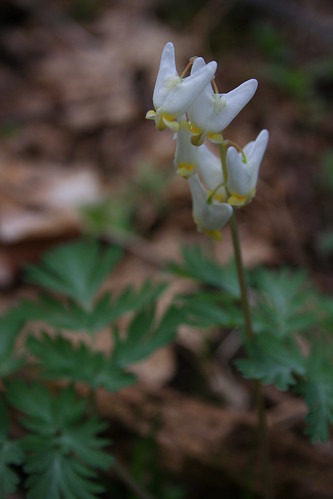
Spring wildflowers on parade. Dutchmans breeches, Dicentra cucullaria.
(*photo credit)
May 18, 2013 The Commons: Does Enclosure Continue Today?
Around the time of the 16th century and especially into the Napoleonic Wars of the turn of the 18th century the common lands of England's rural villages were progressively enclosed by those who wanted to "protect" the land from the tragic overuse of the commons by the "greedy" locals. In the past, local communities self-regulated their common resources against overuse by such greedy folks. However, ambitious property holders with governmental connections saw a chance to regulate by sole "stewardship" and so enclosed the commons for private use. This exploitation of common lands, from the discovery of America through progressive colonization, continues today by multinational takeovers of private African farmlands and Amazon deforestation projects.
Land is not the only culprit. When the commons of water is privatized, common resources are diminished. When air is polluted by a major fossil fuel power plant the common resources that belong to all are "enclosed" by a few. Some would argue the benefits of a multinational cultivating of former lands held by small farmers; they claim that air or water resources are for the taking, and so the "use" of these resources is a benefit to some of what was "unproductive" in the natural state -- and in the long term would benefit everyone through a trickle down of benefits. But all this is the making of the false myth of massive privatization.
In Reclaiming the Commons we extend the definition of commons to include more than land, water, and air through enclosure or appropriation of a res nullius. We take joint action to safeguard these rights of all to air, water, and to some degree land. We also talk about common cultural and historical places and practices; these are worthy of a global effort at preservation for variety enhances the whole world. We consider that if the commons is meant for all, then human health benefits need to be extended to the whole world. We have an ally in the book's sixth chapter involving intellectual commons from James Boyle and his lucid book, The Public Domain; he regards what is happening in copyright, patents, and other practices as the Second Great Enclosure.
Protecting and enhancing the "common good" as agents of change takes us into the last set of groups involved in commons. We must work together, share resources with those lacking essentials, and allow people to express their freedoms. Extending commons to silent space is not really too much of a stretch, for otherwise, without compromise between silent seekers and soundmakers silent, space and time will be lost. Our last areas of commons are still more difficult to grasp, namely the common quality of commerce and human movement, for financial wealth is a resource that belongs primarily for essentials of all and only secondarily as a luxury for the privileged few. The commons of space for exercising human freedom includes physical movement from place to place for better opportunities; one group should not enslave another.
Prayer: Lord, help us to defend the right of all to resources.
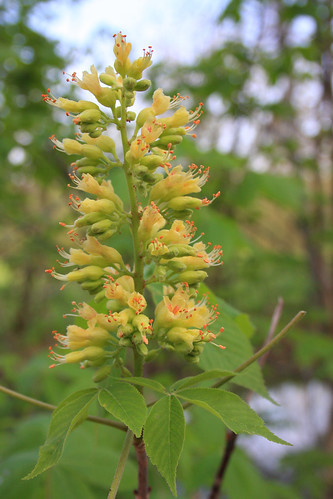
Flowers of the Ohio buckeye tree (Aesculus glabra).
(*photo credit)
May 19, 2013 Pentecost: Spirit Communicates and Babel Confounds
Today is our 2785th daily, seasonal, or extra special reflection since this series started. We strive for different subjects because God loves variety and that is shown in the vast diversity of all creation. We strive to probe, admire, and enhance this multitude as though given by God as part of our family and collective treasure. We discover that each human being created more to the image of God has a vast difference from others. We're impelled to show these differences and in doing so we become an outward expression of the Holy Spirit who is within. We show infinite variety in facial expression, sense of humor, manner of praying, and reaction to information and conditions of life.
Fidelity to the Spirit includes our recognition and love of variation and willingness to communicate these to and with others; the very relating with others is through similarities and differences. Spiritually-starved people pride themselves in adhering to an internal conformity, regimented manner of acting, singleness of thought pattern, intolerance to new situations, and utter predictability in every circumstance under their control. Seeing uniqueness as part of freedom gives way to sharing with others, otherwise people become robots and lifeless. Blandness is "spiritlessness;" celebrated uniqueness is spirit-filled.
Babel, as found in Scripture in the division among peoples, stands in contrast to Pentecost that unites people even granting differences in tongues and places of origin. Is Babel declining when each of the world's approximate 7,000 languages die out at one every two weeks? Certainly the multitude of plants and animals and stars and rock formations only show the greatness of the creator. We learn about each unique language and translate; we make differences accessible when needed; we add to human cultural commons in recognizing diversity. Babel is selfishness standing apart, greed in grasping gifts that are not shared, pride in differences that remain foreign to others, and comfort in profound isolation. However, fuller human growth demands sharing unique gifts, not suppressing them. Cultural and language differences are translatable; we thank God for gifts to share via the media.
Variety is celebrated when others come to know culture as treasured by a few; we share the divine spiritual delight. When some want to restrict variety through power moves or lack of interest, a Babel grows in individualized selfishness. When people want to celebrate the great blessing of human cultural expression and use resources to ensure the continuation of recorded languages even when threatened with extinction, this becomes a Pentecost event -- for the love of the commons is realized within the diversity of the cultures present. All reach out to Pentecost for the return of the human being to a family willing to celebrate uniqueness, as the tongues of fire rests on the heads of each.
Prayer: Holy Spirit, inspire us to discover the gifts given to others and a willingness to share differences with them.
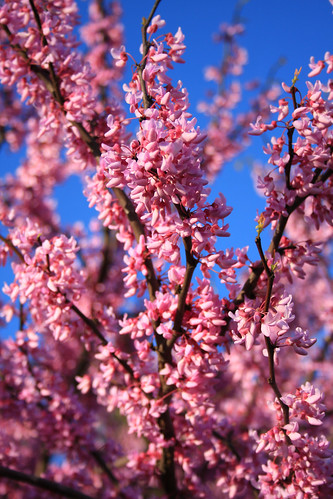
A sea of color. Eastern redbud, Cercis canadensis.
(*photo credit)
May 20, 2013 Charity and Appalachian Development
In our mountains a number of people come begging for utility payments and food, especially towards the end of each month. In some cases they genuinely need assistance; in others they are taking advantage of the generosity of individuals who tend to listen and help the needy. Making the distinctions between those in need and others is often quite difficult. No doubt many recipients appreciate the generosity of our parishes and these are generally material gifts ranging from food to clothes and toys. Certainly givers feel good in giving; however, what does it do for the poor of our region?
Charity as power. A cynic will say that a spirit of charitable giving comes from an inflated sense of power that allows us to give from a surplus that should not have been there in the first place. Charity may come from being aware that others are in real need. But does charity as an exercise of power only prolong the agony of the poor? In justice, all have a right to essential resources first -- and our government must guarantee that right. Now we move to a different mindset -- not that the private sector picks up the pieces of our region's poor, but that it becomes the focus of improvement of this incredibly beautiful region's ability to share natural endowments. Should charity as a tool give way to finding social improvements such as employment to assist in earning power, not the power of giving to the needy?
Church activities. Yes, Churches pick up the pieces giving out charity to beggars, some of whom should not qualify. But this is not more than a temporary answer. Certainly when the tornados occurred two years ago, the outpouring from non-affected parts of our Commonwealth and beyond was overwhelming -- and thank God people cared for those in extreme need in such a spontaneous fashion. However, the problem with charity is that it is good in acute cases and bad in chronic ones, that is, for answering longer term problems such as persistent poverty. Residents can become charity cases, and it can puzzle us as to real cases of need.
The Church's role. Quite often churches act as defenders of the wealthy and encourage them to give from their surplus, which they never should have had in the first place. The two-class system of have and have-nots works well if the haves are prodded to give and the have-nots are prodded to be patient and await their turn. How about the inverse? What about the haves being prodded to accept heavier taxes with revenues needed to create jobs in the poor region? What about the have-nots being prodded to rebel and call for the right to a livelihood? Well and good, except governmental agencies can waste money, and some poor are lazy. Maybe St. Paul was right, if you don't work you don't eat.
Refer to Robert D. Lupton, Toxic Charity: How Churches and Charities Hurt Those They Help (And How to Reverse it), Harper One (2011).
Prayer: Lord, teach us to know when others are truly in need.

Black rat snake, common Kentucky barn resident.
(*photo credit)
May 21, 2013 Soot: A Climate-Changing Pollutant
An air pollutant which was known from the start of the industrial revolution and worrisome long before the word "environment" was coined is prominent again. No one likes soot, whether those in a factory town hanging clothes outdoors or those in a rural village who use an inefficient cooking stove in an enclosed hut (see August 7, 2007 and August 20, 2008). Researchers supported by the International Global Atmospheric Chemistry Project have found earlier this year that briefly staying soot or black carbon not only absorbs sunlight (as expected), but is a powerful climate change agent. Carbon dioxide has a warming effect of 1.7 watts per square meter of Earth's surface and black carbon 1.1 (original estimates by the UN Environmental Programme (UNEP) were 0.3 to 0.6) watts per square meter. This makes it a more troublesome character than worrisome methane, with its unreported leakage rates but longer staying time.
Researchers for a number of years have sounded alarms about the blanketing of soot from the atmosphere on glacier surfaces and other snow- and ice-covered surfaces in many parts of the world. The Arctic region is an area of deepest concern. The soot settles on the surface and acts like the dark object we observe in winter melting faster on the sidewalk than the snowy surface. Now extend this to objects on the surface of a glacier or on the entire Arctic region. Higher altitudes are more susceptible and regional precipitation patterns are changing -- all because of environmental pollution causing shiny surfaces to become soot-covered.
Soot is already known to be a major health hazard; we have spoken several times about indoor air pollution problems and the billions who are affected. The UNEP has estimated that if black carbon emissions were controlled some 2.4 million lives could be saved annually. Thus, there is a twofold reason for curbing this worrisome air pollutant, which only remains in the air less than two months and not for years.
Removal of soot is not as major a problem as reducing carbon dioxide levels, for some 70% of the emissions in Europe and North America come from diesel engines that could be controlled with relative ease. The indoor soot generation in hundreds of millions of emerging nation's residences is more difficult to control than that of vehicular emissions, though the problem could be solved by widespread introduction of solar ovens or more efficient cooking stoves. That is easier said than done. Paying close attention to removal of soot generation and cleaning the air of this climate change generator certainly would buy time needed to tackle the carbon dioxide problems. However, we all know how much this is a cultural problem when it comes to new ways to cook meals.
Reference: The Economist, January 19, 2013, p. 79.
Prayer: Lord, give us the insight and energy to continue
efforts at identifying pollutants and controlling our environment.

A spring day by the shore.
(*photo credit)
May 22, 2013 Maritime Day and Ocean Problems and Solutions
You strode the sea, you marched across the ocean, but your steps could not be seen. (Psalm 77:19)
Our ocean commons covers two-thirds of the planet's surface. On Maritime Day we recall that Chapter Three of Reclaiming the Commons deals with our land and ocean ecosystems.
----------------------------
In order to protect the unique beauty of coral reefs and value of ocean ecosystems, an effort must be made to declare them globally protected wilderness zones; portions of these fragile areas such as Australia's Great Barrier Reef ought to be off-limits to tourists and fishing operations. In place of tourist ventures, a substitute is to promote virtual tourism, that is, the coral reefs could be appreciated through photographs, videotapes, books, and articles.
Global commercial fishing extends beyond national waters and the reach of national controls. Often annual limits are placed on various types of fish such as the North Atlantic cod, and then limits are exceeded through lack of strict enforcement -- and overfishing may lead to fisheries collapse and extinction. At current rates, the oceans will be overfished for many species in only a matter of years or decades. Global fishing regulations must be strict, with enforcement under United Nations supervision.
The International Whaling Commission has enforcement powers. In fact, no commercial whaling is supposedly permitted, only harvests for research purposes. Greenpeace has a ship that follows the Japanese whaling "research" fleet to the Antarctic Ocean areas because the environmental group is convinced that the whaling is "commerce" under the guise of research. In order to preserve various whale species, harvesting of all whales ought to be halted.
For a quarter of a century the U.S. has blocked an effective "Law of the Seas Treaty," especially one covering all oceanic resources, especially those on the ocean floor (e.g., mining of manganese); these would be administered through an international body under United Nations auspices. Expanded powers of UNCLOS could call for the regulation of the extraction of fish, petroleum, minerals, and natural and cultivated seaweed from the seas. The ocean commons should not be divided among competing countries who seek enclosure and control. Rather, the oceans must remain open for the benefit of all, and should be subject to a uniform system of controls. International exploration licenses could be issued with the revenue going to marine development, policing and monitoring agencies. As technologies allow for deeper oceanic extraction, the need grows for global regulations and global licenses.
-------------------
Prayer: Lord, give us courage to protect our Ocean commons.

Fruits from fencerow plantings.
(*photo credit)
May 23, 2013 Edible Landscaping Benefits
We cannot eat the landscape, only the produce off of the land. However, the landscape is not meant to be a showcase of affluence, but land in practical use. Seeing land as productive still presents a mentality from which many benefits flow:
1. Environmental awareness -- The landscape as presented to neighbors who pride themselves in manicured lawns of precise types of grasses, amount of mowing, and use of sizeable resources to equal or excel the neighbor, is affluent and wasteful showmanship.
2. Food production -- We live in a world of land shortages for growing essential amounts of food. The global pool of good homegrown food is increased by an edible landscape. Many lawns are potentially fertile ground for productive crops.
3. Beautification challenge -- We know that beauty is in the eye of the beholder, but a varied landscape that changes through the growing seasons can be regarded as more beautiful than a monocultural lawn that looks like the next door neighbor's. Make landscape change in beauty throughout the seasons.
4. Wildlife habitat -- Landscapes could have areas like untended fence-row growth that are habitats for small mammals. The landscape can furnish feed for birds and small land creatures.
5. Physical exercise space -- We need to observe the work of our hands, and the edible landscape showcases this quite well. The joy of gardening is expanded to a larger landscape and may require more recreational time.
6. Educational opportunity -- Gradually some neighbors will have the courage to ask what to do and how to improve their land, and this makes the landscape part of a model neighborhood where lawn care can be decreased by a willing community. Objections to edible landscapes may be voiced in community educational moments.
7. Meditation place -- We do not have to get away in order to reflect and pray in sacred space. The edible landscape, when well cared for, is an inviting space to come and rest.
8. Expand tasteful varieties -- Quite often people do not recall the taste of homegrown produce and by planting variety one allows taste buds to become more discriminating.
9. Spiritual promise -- We can continue the work of the creator through the re-creation of land sites. This gives us promise that our damaged Earth can be repaired and turned into a garden that it was originally meant to be. To better our land is to make it a place worthy of praise to our Creator.
Prayer: Lord, give us the foresight to see all landscape as
a gift worthy of respect, care, and benefits for all.
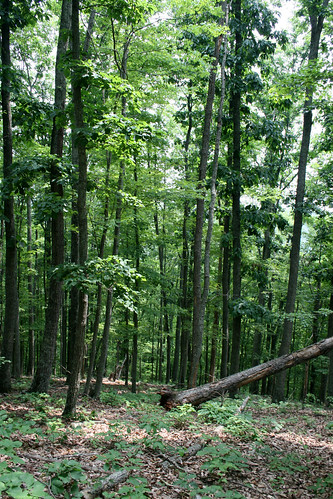
An afternoon stroll, Cumberland Gap National Historical Park.
(*photo credit)
May 24, 2013 Conversations with the Spiritually Unaffiliated
I spend Sunday in the cathedral of the forests. Anonymous
We are not puppets obeying the blind forces of evolution, but people endowed with the spirit of freedom of the God who creates all out of love and mercy. The vague hope of adherents in blind evolution is ultimately spiritless, and thus betrays despair at working together to change the course of history.
A growing number of people (including acquaintances) pride themselves in abandoning church affiliation to join the spiritually unaffiliated (SUA). They know that "spiritual" is of itself neutral and includes angels and devils, and so they are open to a devolving debate as to the relativity of good or evil. Personally, I prefer the agnostic to the SUA, for there is a tinge of humility in the former and all of us fit in that category on one or other position or practice. I am an agnostic about "water witching." Let's look critically at SUA tenets:
* HERE. True human integrity accepts the imperfections and limitations of our brothers and sisters, and that we as social beings share the results of these falls in our human family. In our age, a confessing Church that finds forgiveness utterly needs to refute the denial of imperfection. The failure of the SUA to publicly admit imperfection (e.g., deny human causation in mishaps) shows a pride that ultimately lacks basic social integrity.
* NOW. Active Christians ought to be revolutionary (lowly rise and those in high places come down -- Luke 2) but in a non-violent manner, for not all revolutions (e.g., 1990 velvet one) need to be violent. SUA people who call for a new order actually are revolutionary but lack the courage to admit it. And courage can grow in publicly professing one's faith.
* WE. Contrary to hopes of all, the unsustainable economy is gaining momentum in this world, leading to irreversible effects that will destroy the planet's vitality. We must join together in this critical task and respect the areas of faith that empower people to break away from addictions and work for the common good.
When SUA people associate religious institutions with corporate states and multinationals, their biases do a grave disservice to the hopes of ever working together with professed believers.
* GOD. A failure to understand the social addictive nature of our culture allows all to consume and continue their captive addiction. Ultimately, this is a rejection of a genuine need for a Higher Power. A SUA liberalism that allows all to continue to do "their own thing" is a continuation of the state religion of commercialism and its often noted destructive effects, namely, to strive to satisfy the insatiable appetite for material goods. Voluntary simplicity is not enough; controlling laws are needed.
Prayer: Lord, give us the inspiration to talk with SUA folks,
and to find ways to instill trust and elicit professed faith.

Sparassis - species unknown.
(*photo credit)
May 25, 2013 Debunking America's State Religion
"The first major change must be the disestablishment of our national religion: commercialism." The Contrasumers: A Citizen's Guide to Resource Conservation, (Praeger, 1974), p. 155.
The state religion could be defined in the above words or as "the consumer culture" or "unregulated financial Capitalism." We may quibble about the exact title or over whether the unregulated aspects are inherent to a global capitalism that must be replaced, or something that tweaking this system will adjust. Most Americans who see the consumer culture or capitalism as a state religion (without admitting it) would opt for the latter. For them, capitalism is opposed to communism and they tend to forget that the Chinese Communist Party leaders (some billionaire) are foremost proponents of global capitalism and strong advocates of the worldwide consumer culture.
To dethrone capitalism is a revolutionary challenge shared by the unemployed and disgruntled, a few radicals and perhaps many unsuspected but silent folks? We can make common cause with them provided they desire a non-violent revolution wherein taxes will be the tool of equalizing individuals and global corporations (some call it "Corporate Socialism") as well. Unfortunately, this confusion of ideologies muddies the picture and makes discussion problematic. I note in horror that my opponents criticize my stance by blending their capitalism into their Christianity as though it is all one. Part of the problem with many church goers is that in seeking limited funding, they overlook moral demands and become faithful adherents of an enticing capitalistic system.
As described in Reclaiming the Commons, proponents of a capitalism blended with religious piety accept the motto "In God We Trust" but the god trusted is the Dollar. For them, those fated to handle this sacred trust are investors and hedge-fund operators; their financial centers are their churches, the daily stock market readings are prayers, their agreeable economists are theologians, their congregation is the citizenry, and their participation based on their willingness to consume an ever widening range of luxury products. To question this stance is to be regarded as heretical and courts the risk of being thrown outside the pale, since it is only adherents who can have proper credit ratings and participate in worshipping the great god money.
Our inability to make a change in this dysfunctional mindset baffles us and, unless we are people of ever deepening faith, we will give up and say it is useless. The call is for an ever growing awareness of what is befalling our country and world -- the reign of materialistic darkness. We must share knowledge of our situation, which we do through coming together to begin a process of correction. This deserves much additional effort and prayer in confronting Earth's major ill, excessive consumerism.
Prayer: Lord, give us the grace to see with the eyes of faith.

Large flowered trillium, Trillium grandiflorum, in pink.
(*photo credit)
May 26, 2013 Does Being Godly Bear the Marks of the Trinity?
Trinity Sunday always challenges us because of the depth of the mystery involved. Homilists will attempt to handle this deep mystery with kid gloves. However, we cannot avoid but must confront mystery for it challenges us in our eternal quest to know and be with God. We realize that all human beings are made to God's image, and that through our Baptism/Confirmation we vow to act in a godly, even a "trinitarian," fashion. We show this deep mystery in a far less but still mysteriously lived-faith experience. That includes the history of God's loving manifestation as creator, the coming of the Incarnate Word among and within us, and the manifestation of word through living deeds that we strive to undertake according to our circumstances in life.
Respect, deep down and moving respect, is the hallmark of Godliness, for it reaches to the entire great and magnificent extent of this massive universe. The supremacy of God's hand is before us, and this tells us something about the intelligence and balance that make up the unfolding world around us. Respect is the virtue on which all authentic religious expression is based. During the month of May, life quickens with exaltation associated with a new growing season. We pause to experience life in some of its many forms -- a buzzing, busy bee going from blossom to blossom, a nestling venturing forth, a shimmering countryside ablaze in spring beauty. We go alone but cannot stop. Private experiences must extend outward through public worship, for what is experienced cannot be privatized if we are to grow in godliness.
Sharing love is part of being godly. From respect proceeds merciful love that shows itself in our lives. We discover the life of Jesus now penetrating within our hearts. Here the history of creation finds its deepest seat in who we are and how we act as companions of the Incarnate Word spoken through our world. We become that Word to others through our lives. In speaking as a body, the Church, we unite as people who are the Body of Christ, and our spoken liturgical Word is the fullness of the Lord in our midst. Whenever we praise God, spread the Word, and live fully Christian lives, Christ is with us.
Enthusiasm springs forth, not only revealing the God within but the Spirit bursting forth; this is a creative power at work in our world and now expressed in loving deed through human acts. We are more than private or public silent worshippers; we are people who extend what we receive in a way that others can benefit. The Spirit flows forth as loving deed from experienced Word and empowers us to go beyond the believing community and assist others in a meaningful fashion. Thus through loving deed we extend God's creative powers. Through what we discover in our world, and what we love in Christ, we bring about an enlivening of Spirit wherein what we profess manifests a future glory now being born.
Prayer: Holy Trinity, in this year of faith, help us to
speak about the deepest mysteries in which we dare to believe.

Memorial flowers in May.
(*photo credit)
May 27, 2013 Memorial Times and Places
Memorial Day is a civic sacred time and is often associated with war heroes who have passed on. On this special day we do what we ought to do throughout the year and that is remembering others. Needless to say, busyness of life often crowds out our ability to honor those who sacrificed their lives for our wellbeing and country. Memorial Day makes us turn our attention, at least briefly to burial places containing the remains of our warriors.
I recall one Memorial Day when a student on the Fordham University campus in New York and a small handful of elderly gentlemen were clustered around a small memorial in the outdoor corner of a building that I had never noticed before. It was a memorial to fallen alumni and was evident these were a fading remnant of World War One veterans who came each year to remember their comrades buried on Flanders fields amid the poppies, and sadly enough they knew their ranks were thinning. Now a half century later, none of these hearty souls survive and the World War Two ranks are thinning rapidly at this time.
Living memory is so fragile, for time passes, and that is why we strive to get those who follow us to manifest the same respect
that we were taught in our earlier years. In my youth, our farming folks observed the Sunday after Memorial Day as "Decoration Day." Relatives living a little distance away returned. We brought food and sat around and had a small picnic in the cemetery, for time did not permit going to one or other homestead of those of us living closer to the gathering place. People met together, chatted, decorated graves, and we kids would wander about the cemetery and hide among the monuments. It was as though the ones who passed on came back to converse (now four generations are buried in the St. Patrick's Cemetery in Washington, KY).
Little remains of that family gathering tradition -- and yet my grandfather made me promise (when he was old and I was very young) never to forget his dear wife who preceded him in death. Grandma had said to remember her with a wild daisy. Each year when possible I return to lay that daisy at her grave, and on my mother's near grave as well, for Mama had remembered her own mother's grave with choice homegrown flowers while she lived and was able. One of my younger first cousins who grows wonderful flowers promises me she will keep the tradition alive while she lives. Time moves on and memories fade all too soon.
Special places are sometimes hard to visit, and so memories found in yearbooks, photos, and mementoes of important events have their own special significance. This is truer as we become immobile and visits to cemeteries more infrequent. Memorial Days remind us both of others and of our own mortality.
Prayer: Lord, our memories are your gift to us; they seem to tarnish with time and yet they suggest treasures to be restored in eternity. Help us keep memories alive while they last.

Remembering puppy's first day at new home.
(*photo credit)
May 28, 2013 Photographs and Precious Memories
Recently a cousin sent me some hundred year old photos of my grandparents weddings and other associated pictures of bygone times. Before sending these on to my sister, our family historian, I studied the photos intensely, for these recorded images tell so much about the noble characters of those whose genes we carry. Such historical photos bear so much information for us of fashion, bearing, and attitudes of those being pictured. The young had to remain motionless for formal photos far longer than now, and their patience was always tested in such sessions.
Historic events. Photographs mean so much to all of us and come all too easy with digital cameras attached to many current electronic devices. Facebook has made an industry of the propensity of folks to record much of the present for self or others. It is the urge to hold on to the present moment, for we know it will never return. I admire those people who are willing to record well such as Janet Powell who has taken many of these photos and our collaborator Warren Brunner, who is able to elicit the best in people being documented. The art of picture-takers includes an invitation for the recorded to be natural, for such records are worth more than a thousand words. That applies both to the picture and the recorded subject.
Artistic happenings. Many of the world's photographs are clear works of art of either a primitive or expert variety. This encourages a multitude of budding artists to seek to capture the essence of beauty they find around them. Thank heavens for the potential to be artists, for thus we delve into the mystery of being created in God's image. We can execute art in many media from music to drama, dance, sculpture, paintings and other forms. Few compare with the simple well-executed photo that is done with speed and yet is expected to endure for as long as photographic paper or digital media remains. Photo-taking is quick but endures as a lasting tribute much past the musical and dramatic moment.
Spiritual testimonies. I regard many of the photos that introduce these texts as holding equal weight to the words written; they capture a sense of the drama facing our world and affirm in picture what is said in words; they are the testimony that more is to come, a hope in a better future. As mentioned in the reflection on the first of this month, a flower photo gives me and other viewers the hope that struggles we are undertaking are worth the effort -- and that victory can be achieved if we have the faith that it is possible. Photographic art is best coupled with written word for it both tells the limitations of those words and still helps fulfill them in a unitive manner, for the spirit of art and the flesh of written testimony combine in an incarnate way, like God walking among us.
Prayer: Lord, lead us to appreciate the creative moment of others, both those who take the photos and those who are willing to be subject of this recorded medium. Help us do all things well.

Peony of May.
(*photo credit)
May 29, 2013 Institutions Hear: Who Pays the Piper Calls the Tune
A few years back a professor at a university told me that he would never be able to say everything that appears in the content of this website and remain in his illustrious position. This gets a person thinking because I regard myself as a conservative when it comes to social and financial affairs. My political thoughts may extend beyond the confines of this educator's range of expressed opinion, but are they really unable to be said at certain places?
Accountability. Several months ago in his State of the Union message, President Obama mentioned the need for those going to college to come to know the "bang for their bucks," or the potential benefits of what they pay for. This academic accountability is only part of the needs in the massive trillion dollar enterprise called academia. Perhaps financial responsibility is not the total picture, though some academics are professed radicals.
Another issue is expectation by donors as to what is taught or not taught at institutions where they are giving their "charity." The subtle control of the contents of the teaching profession does not allow people to talk about the dysfunctional and unsustainable economic system in which we are immersed, and the need for future change in the governance of our world from the local to the global level. An uncontrolled global capitalism must be assaulted at its roots and the nurturing of a new system is necessary, but are academic settings the place to profess such beliefs?
Theoretically free. Perhaps some schools will allow a stray professor to speak of such matters but not all, and these speak in guarded ways. Theoretically the academic can say what he likes, but he or she cannot become too vocal, for the stream of charity may be diverted to far more status quo competitors. It is no accident that the public interest movement did not start with academic roots, though public interest research is done in a neutral manner.
Practically restricted. Strangely, what I say is not so heretical from the secular standpoint, but it is from a prosperity Christianity position. Here we constantly insist that the root of the environmental crisis is consumer addiction, foisted by a commercial media in alliance with an economic system fostering ever greater consumer demand for resources. Current piety sees troubles elsewhere and skips around the private sector respect for the divine right of the wealthy. Shouldn't the religious academic community be the most radical critics of the system? The piper's tunes coming forth from these institutions have little or nothing to do with the real world with a crisis triggered by and retained by uncontrolled wealth and its profiteers. Where are the learned prophetic calls which ought to come from academic halls?
Prayer: Lord, give us courage to speak out in times of need; these moments of climate change call for us to study the roots of the environmental crisis, to address them, and to call for help.
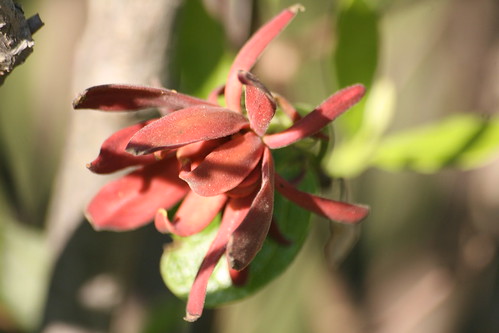
Appalachia's strawberry bush, Calycanthus floridus.
(*photo credit)
May 30, 2013 Private Wealth in Contrast to Commonwealth
The true friend of property, the true conservative, is he who insists that property shall be the servant and not the master of the commonwealth. The citizens of the United States must effectively control the mighty commercial forces which they themselves called into being. (Theodore Roosevelt, 1908)
Wealth is not of itself bad, for it is an accumulation of what is valuable by a given culture from the richness of God-given resources. What is threatening to a democratic people is wealth in the hands of individuals, whether public officials or the individual privileged billionaires. In either case these seek to act beyond the realm of public accountability. Due to the need for responsible oversight, democracy demands knowing and confronting influence that accompanies wealth in the age of globalization.
Commonwealth is a political unit (state, nation, etc.) founded on law and united by compact or tacit agreement of the people for the Common Good. Using this title are the British Commonwealth, Commonwealth of Poland, Independent States (former Union of Soviet Socialist Republics) -- and four American states along with Puerto Rico. American citizens perceive little difference between commonwealths and states. Combining the words "common" and "wealth" indicates responsibility by citizens who must work with a properly functioning government that defends the Common Good. For the citizen, the term "commonwealth" triggers a spirited response, a sense of joint defense of the public interest, and a value in shared benefits for all. Kentucky is a commonwealth.
Sound the alarm! Uncontrolled wealth in this globalized society has become so great that nations and people are subservient to the rule of plutocrats. Commonwealth advocates must speak up in the defense of democracy. Unfortunately, the myth against the benefits of government as such is so great among libertarians that they overlook the host of wasteful and totalitarian wealth holders and the many who control money in a perverse manner, such as through tax evading tax havens. The wealthy one-fifth of Americans are the most government-subsidized, not the poor as the myth implies.
Mutual benefits for the advocates of commonwealth means taming the influence of the privately wealthy. It also means holding accountable those entrusted with the national or other accumulated public wealth. Neither responsibility ought to be overlooked, for the good of all the people. One is not better or worse than the other, for while wealth can benefit all, it can contaminate a few who become mesmerized by its power. Citizens must stay alert.
Prayer: Help us Lord, to heed the words of Benedict XVI: When for love of God we share our goods with our neighbor in need, we discover that the fullness of life comes from love and is returned to us as a blessing in the form of peace, inner satisfaction and joy.
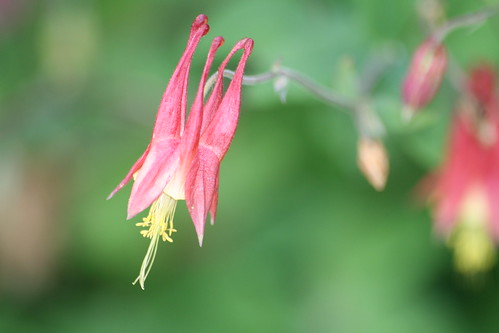
Aquilegia canadensis, Eastern red columbine.
(*photo credit)
May 31, 2013 The Principle of Environmental Commons
The following are the finishing notes of Chapter Three on the Land Commons in Reclaiming the Commons:
---------------------
We need to share land and other physical resources so that we can regain our common inheritance for the sake of the entire human family, many of whom are in grave need of essentials. Our immediate task is to regulate the distribution of resources to the degree that they are needed to assist all of us (including future generations) to live worthwhile lives and to renew the face of our wounded Earth. We must refrain from overusing or misusing these resources, for misuse leads to greed, insensitivity, and selfishness by the privileged few.
The Common Good versus the individual benefit is the issue: social justice or individual self-satisfaction; non-profit motivation versus material profit motivation; the public interest and private interest. A win-win situation is possible through satisfaction with what we have materially and seeing that the satisfaction enhances others through a sense of contagious happiness. Our sharing is a good and when all take without giving then dissatisfaction festers and community is harmed. Actually, the good of all individuals is collectively honored. However, attaining this situation does not come automatically. Sharing is a community-learned experience that some primitive societies and intentional communities have achieved; this needs to be globally actualized. In fact, it is contrary to the pervasive capitalistic culture, which is characterized by stiff competition and pressure for individuals to excel over others, a primacy of self-attainment at the expense of the commons -- and this festers unhappiness.
The Common Good derives from the natural law and is the goal of all people of good will, who believe that benefits will come through communal sharing. The concept of Common Good has a long history in the course of social justice development in Catholic Christian circles. However, the concept predates Christianity and is found in Greek and Roman writings and in rich expressions in other cultures as well. Primitive cultures regarded resources held in common for their mutual benefit as a "Common Good," whether articulated in a formal ethical manner or not. In our age of individualism, a return to communality is most difficult, but reclaimers of the commons must transmit the good of primitive cultures back to our dysfunctional system.
Radical sharing means all benefit and all participate. In order to share, creativity is needed because the outcome is in doubt, mutual support is weak, and barriers seem overwhelming. One practical problem is that a system of total inclusiveness runs contrary to the tendencies of those who are quick to "exploit" natural resources. Because privileged power brokers control so many of the mass media outlets, our democratic process, which ought to promote sharing, is hampered and restricted.
Barriers that discourage sharing resources must be overcome. In fact, the vast majority, the lowly, the voiceless, and those who suffer are starting to stir -- in North Africa, in the Middle East, in China, and in the West. Modern communications breaks former isolation and discontent, and more people become conscious of inequalities in distribution of goods and services. The disparity of resources is evident, and counseling patience until goods and services trickle down is wearing thin. Discontent grows with escalating food prices, and persistent unemployment; we hear that the superrich have become richer, and the poor and middle class are left behind, and that more government funds go to the richest one- fifth than the poorest one-fifth of American population.
Quality livelihood is a right of all people. This means access to food for a higher quality of life (enough for all). Food producers ought to have access to sufficient land for family needs and livelihood. Land holdings, whether wilderness, fragile land or fertile crop-producing land ought to be protected and used primarily for essential needs. Private land for farming and housing is affirmed, provided this is not excessive. Productive land must be maintained properly through fertilization, erosion control, and zoning rules. Damaged land requires reclaiming; abandoned land needs to be resettled according to best practice and put to productive use or returned to a natural state. Fragile and non-productive land needs to be designated, monitored, and wildlife habitat maintained. We must protect threatened flora and fauna.
-------------------
Prayer: Lord, give us an understanding of the common good and inspire us to undertake our sacred political duties to defend it. |

